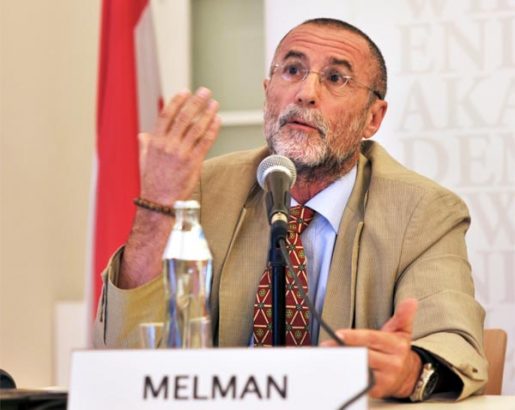In early April, deputy editor Samuel Nurding sat down with Haaretz’s intelligence and security correspondent Yossi Melman and spoke about Israeli security challenges. Their discussion included the spike of terror attacks in Israel since early March, the Israeli-Palestinian conflict, the threat of Iran, as well as the Ukrainian conflict and Israel’s strategic relationship with the US.
The Terror Threat
Samuel Nurding: The latest terror attacks in Israel were different in the sense that they were started by citizens of Israel before spreading to West Bank Palestinians. Is this a pattern we could see more often in Israel?
Yossi Melman: 99 per cent of Israeli Arabs are innocent and want to assimilate into Israeli society. The biggest manifestation of this is the fact there is an Israeli Arab minister from a left wing party and in the current government and an Islamist party is a member of the coalition and supports the government. However, parts of the communist and nationalist Arab parties are against integration with Israeli society. What surprised many Israelis about the recent terror attacks in Israel was that in two of them the culprits were sympathisers of ISIS and had been jailed previously for their known views. They were radicalised by watching ISIS propaganda and one had tried to join ISIS via Turkey. Despite this, they were released by the Israeli courts and the security services failed to watch them properly. I do appreciate the counterargument that the security services cannot watch every potential terrorist and that there are legal restrictions in place in which you cannot jail anyone and everyone just because they agree with a particular set of views. But these attacks were a result of an intelligence failure.
SN: As you mention, United Arab List leader Mansour Abbas joined the coalition to try and get the state to clamp down on crime and violence in the Arab sector. Can you explain just how big a challenge this is for the government and Israel Police?
YM: It’s a huge challenge mostly for the police, but also for the Shabak (security service), because it has been neglected by consecutive governments over many years. The problem is multidimensional, and we need to tackle the roots of it – cultural, social, political and educational. The governments of the last 12 years claimed to allocate billions of NIS to improve the standards of living of the Israeli Arabs but in fact did very little. As a result, the Arab sector turned into a kind of Wild West frontier and weapons are easily available. Some guns are homemade but some come from the West Bank or are stolen from military warehouses. Most of these weapons are used in gang fights, and I think the government and police cared very little in stopping criminals from killing each other. However, the problem was not confined, and it begun to spread. The path from crime to terrorism is very short; sometimes it uses the same people, the motives for each can be similar, and therefore the challenge is immense.
I think this current government is doing a good job in trying to uproot the problem through financial and educational programmes, but also the police are employing tougher methods to confiscate weapons and locate gang leaders, and the criminals are realising they’re under a lot of pressure at the moment, so they are laying low.
SN: What exactly is the government doing to help the police?
YM: The government has increased the budget for the police and are recruiting more officers. They have beefed up the police’s intelligence capabilities through new technologies and legal instruments. At the same time the government knows it cannot fight criminality just by chasing the criminals; it needs to also create the right atmosphere through educational programmes, improvements in health conditions and by giving the Arab community hope. There is a real problem within Arab society. Over many years they were side-lined by the government in terms of housing – many Bedouin communities are still not legally recognised and therefore have no running water or electricity. But on the other hand, the government is very fragile and it can fall down in any moment, thus its good intentions and the work done so far might be discontinued. So the good work done so far could be uncompleted.
Ukraine and the US relationship
SN: What have you made of Israel’s careful calibration not to lay the blame completely on Russia regarding the Ukrainian war?
YM: I’ve been critical of the government’s stance on Ukraine. I don’t accept their decision to sit on the fence. I hear and understand the security justifications for doing so, mainly in Syria and the Russian factor. One has to be honest to the fact that Russia was turning a blind eye to Israeli airstrikes on pro-Iranian militias and Iranian military targets. And yes, Russia could have challenged the Israeli tactics in Syria much more with their S-400 and S-300 anti-aircraft batteries there. But it’s in the Russian interest to allow Israeli activity in Syria and eventually remove the Iranian presence there – mostly for economic reasons. But there are moments in history where you have to take sides, and it’s not a big risk to take sides with the good guys. You don’t have to take sides by providing offensive weapons, but you could at least provide defensive weapons. For the first six weeks of the war Israel refused. I think this was wrong, not only from a moral perspective but also from a security perspective. Then under pressure from the US and the Israeli public the government changed its mind and heart and decided to supply 5000 helmets and bulletproof vests to Ukrainian rescue and humanitarian crews. Russia is now bogged down in a war of attrition in Ukraine. Even if they could, they would not open a new front with Israel by disrupting Israeli activity in Syria. Also, by not even helping the Ukrainians in a minor military way, Israel is putting itself in a compromising situation with NATO and the US.
SN: Does Israel have the luxury of choosing not to always side with the US, especially on grand strategy and great-power competition? Will the US be so ‘understanding’ if the next global conflict involves China?
YM: The Israeli position, regardless of the political nature of the government, takes for granted that the US will always be on the Israeli side. So we tease them a little bit because ‘they are with us’. I think this is a wrong judgement, but it is also misreading the American scene today. The country is highly divided politically and the demography is changing dramatically to the detriment of Israel. The older generations which automatically supported Israel – due to the Holocaust memory, family ties, strategic interests etc. – is shrinking and now there is a much more diverse population in the US of immigrants from Asia, second generation Koreans and Chinese, Hispanics, Latino-Americans etc., who don’t have the same affinity with Israel. Not because they are anti-Semites, but because they are simply not interested in us. So in the long-run, it’s wrong to look at the US as if it’s in your pocket. And therefore, Israel should have been much more accommodating to US interests in Ukraine.
SECURITY CHALLENGES
SN: What are Israel’s main security challenges today?
YM: If you talk intimately to military chiefs behind closed doors, they will tell you the top security concern facing Israel is the Palestinian issue. But they know this is not just a security or military problem, it’s a political one too. Therefore, to avoid getting dragged into a political issue, they emphasis other threats, like Iran or Hezbollah. This government has said it is not prepared to sit down with the Palestinians and negotiate a two-state solution. I’m not even talking about reaching an agreement with them, but just talk. We are living on borrowed time; the problem is slowly penetrating into Israel and the borders between Israel and the West Bank are being erased – both between Israeli Jews and the settlers and between the Israeli Arab citizens and the West Bank Palestinians.
Many Israelis would tell you the most important challenge to Israel is the divisions within Israeli society. And I don’t see this being healed anytime soon because it is often manipulated by politicians to try and promote their own political agenda and party interests. If you read Israeli social media, you see hatred everywhere. The discourse is inflammatory.
And finally, Iran is obviously an existential threat to Israel, but it is hundreds of kilometres away, and there is a lot of rhetoric and threats expressed by Iranian officials and IRGC officers but Israel knows how to deal with them to a large degree, or at least a lot more so than the Palestinian issue or the divisions in Israeli society.
SN: Let’s talk more about what you say the IDF sees as the main security challenge facing Israel: the Palestinian question. I’d like to get your opinion on what Israel can and should be doing if negotiations are not on the table. Micah Goodman says ‘the myth of “peace” is freezing the status quo.’ Yet between ‘managing’ and ‘ending’ the conflict there is a huge relatively unexplored ground marked ‘shrinking’. Should the government be adopting Goodman’s concept of ‘shrinking the conflict?’
YM: It’s already 55 years since Israel liberated or occupied the West Bank and Gaza. Yes, it’s true that you need two sides to make an agreement. And it’s also true that in the first 40 years or so Israel went to great lengths to try and make peace with the Palestinians and the Arab world. Whereas in the last decade the opposite picture has emerged do not think it’s a wise notion to try to ‘manage the conflict’. It will explode in your face eventually. I’m also not sure an overall settlement is achievable in the foreseeable future. But even if the Palestinian leadership is not making steps that help those in Israel who support peace talks, it is Israel’s interest to be much more forthcoming and aggressive in the search for peace and offer solutions, such as interim agreements or significantly reduce settlement construction in the West Bank. I want to make clear the conflict is not just a military problem, but the military is the only one tasked with managing the situation on the ground and all they can do is just contain the conflict. So when violence erupts the military deals with it the way they are trained to, and the cycle of conflict is perpetuated.
SN: So what has stopped the government from taking responsibility for the conflict?
YM: This government came to power carrying with it one notion: anti-Netanyahu. It would have been impossible for the diverse make-up of the coalition to come together otherwise. When it came to making a new beginning or new policy on the Palestinian issue, this government is unable to reach any sort of consensus.
Iran / JCPOA
SN: Let’s move on to Iran. Israel’s official line continues to insist that the emerging deal in Vienna is bad and dangerous. However, it’s believed that senior security officials in the IDF and intelligence believe a deal is better than the alternative of no deal and an unrestricted Iranian nuclear programme. Where do you sit?
YM: There has been a major change in the attitude of this government to the Iranian question and the JCPOA. The big shift is that there was a general understanding by military chiefs and political leaders that the JCPOA was not perfect but unlike Netanyahu, who thought better no deal than a bad deal, they believed it was liveable and allowed Israel to monitor the Iranian efforts. Then Trump pulled the US out of the nuclear agreement and imposed new US sanctions, a policy known as the strategy of maximum pressure, but despite the tremendous damage to Iran’s economy Iran’s rulers refused to surrender. This has not been enough to make the Iranians surrender. We are now reaching a critical point whereby many clauses of the original deal will begin to expire in about three and a half years. The efforts by pro-Trump supporters to create the impression Biden is ‘selling out’ Israel has not borne fruit as he has already proven he is a tough negotiator and is not caving to Iranian demands. It appears the main obstacle to a deal now is that the Iranians are demanding the IRGC be removed from the State Department’s terror list. In real terms, this is just a symbolic gesture because the IRGC will remain sanctioned under different laws in the US, and therefore I do not think Biden will go for it.
The Iranians are desperate for a deal to lift the sanctions on them. $100bn is at stake and they need it for their economy. The IRGC is also an economic empire in Iran, so they also see the utility in getting the sanctions lifted.
SN: What does Israel want now?
YM: From the government’s view, it’s preferable for there to be no deal and sanctions remain as long as it can be argued that it was the Iranians who were the reason for negotiations to fail. At the same time, if there is no deal, the IDF and Mossad will keep an eye on Iran and if the nuclear programme reaches very close to nuclear-threshold status, then covert operations inside Iran will return. Iran is almost there, however. I’ve been writing for many years that the Iranians do not know whether they want to assemble the bomb or not. I don’t know any other country in the world that decided to invest in all the infrastructure and knowledge to build a nuclear bomb but didn’t do so within 5-7 years. If you have the determination, knowhow and technology, you can easily build a bomb within that time frame. That is what India, Pakistan, South Africa, Israel (supposedly) and North Korea did. The Iranians have been toing and froing the notion of having the bomb for about 30 years. Ollie Honenin, the former director of the IAEA, who was sympathetic to Israel’s point of view despite the fact that the UN nuclear agency is filled with pro-Iranian people, told me that the Iranian tactic is to play for time, and move slowly but surely step by step. If they meet with strong resistance from Israel and especially the US they will stop and reconsider their options. That policy has been evident in Iran’s very slow, incremental development of its nuclear programme. It’s important to also remember that they have only reached the point of being able to enrich enough uranium for a nuclear bomb. There are two other stages in order to assemble the bomb: the miniaturisation of a nuclear explosive device and putting that device onto a delivery system. The know-how and technology for those two elements still does not yet exist in Iran, but given their scientific capabilities and workforce, it won’t be long till they master those elements if they want too.
That said, the country is highly corrupt. Iran ranks as the number one country in the world for number of prostitutes per capita. It’s also the number one or two in the world for the number of drug addicts. So Iran is a mixed bag on advanced technology, excellency in academic studies, maths and physics, corruption and economic poverty.
SN: Do you think Israel has a long-term strategy to deal with Iran? Looking at the region today, Iran has embedded itself 360 degrees around Israel – Hezbollah in the north, Hamas/PIJ in the West, pro-Iranian militias in the east, and the Houthis in the south. As a result, Israel is fighting Iran on its borders.
YM: The long-term strategy for Israel is not to enter into an open war with Iran unless you are confronted with an existential threat. Former Mossad chief Meir Dagan once said, ‘You launch a war against Iran only when the knife is on your neck.’ I agree with him. We are not there yet and therefore the long-term strategy is to do everything possible up to the point of war to delay Iran’s progress on the nuclear front, and to work together with Western allies in that battle. What is helping Israel is that Iran has become more hegemonic in terms of its aspiration to disrupt the region, and many countries in the West realise this, as do the Abraham Accords states and Egypt. If you put all these factors together, with the domestic economic problems in Iran, you see that the Islamic Republic is not winning, and the region is turning against Shi’aism. In short, Israel and Iran are locked in a war of attrition but both sides are doing everything they can to avoid getting dragged into a direct confrontation.
Syria
SN: One of the manifestations of this state of attrition between Israel and Iran you describe is the conflict in Syria. Over the last year there has been an acknowledgment in the region of Assad’s continued rule and some states, such as Jordan, Egypt and the UAE, are actively working toward normalising ties with Assad again. The UAE is reportedly pushing the line that rehabilitating Assad back into the fold can weaken his dependence on Iran and Iran’s regional efforts in general. Do you buy this?
YM: You cannot completely separate Assad from Iran, because his interests are with Iran. He wants to go back to the Sunni fold, although his power circles in Syria are Shia, because he needs financial support to rebuild his country. The Emiratis and Saudis have been masters of balancing the various challenges they face. The UAE is a small country and will not really fight Iran despite having the most advanced weapon systems. The idea of bringing Assad and Syria back into the Sunni fold is a good idea, as Israel has managed to prevent Iran from building a strong military presence in Syria. If you talk to the former IDF CoS, Maj.-Gen. Gadi Eizenkot, he will tell you the Iranian vision was to bring 100,000 Shia fighters from all over the world and settle them in Syria and create a forward command from which Iran could open a third front against Israel. In that sense, they have failed. The number of pro-Iranian fighters now in Syria is probably less than 10,000. They are also failing in their efforts to smuggle precision-guided kits to Hezbollah for its rockets. Israeli intelligence is so precise that it is able to monitor and destroy Iranian weapon shipment via Syria to Lebanon. However, Iran’s pride will not allow them to give up the goal of having influence in Syria.
SN: But they don’t react to every Israeli airstrike?
YM: They don’t want to react themselves but through their proxies. They recently sent drones toward Israel from Syria and Iraq, one of which was shot down by an Israeli F-35 – the first time in history – and the US also shot down drones. But even when they respond directly, they make sure not to leave any Iranian fingerprints. Even when they attack Israeli embassies around the world they use agents who are directed, trained and equipped by Iran but are not themselves Iranians.
SN: If Iran is so cautious not to get dragged into a war with Israel, are they really an existential threat?
YM: I certainty do not see Iran launching any missiles from its soil toward Israel unless there is direct confrontation between the two countries, because both sides are operating with the same understanding of trying to target the other without being caught. Today both sides are turning more toward cyber-attacks. Although Iran has made great strides in the last decade to improve their cyber capabilities, they still lag far behind Israel. The last two Israeli cyber-attacks on Iran severely disrupted the train and port systems.
Lebanon
SN: In Lebanon, there are different ‘rules of the game’ from the rules of the game in Syria. A confrontation against Hezbollah could quickly develop into a war even without the parties intending that outcome. Yet, since the 2006 war Hezbollah has been allowed to build up a very dangerous military capability. Is war with Hezbollah inevitable or could Israel have done more to prevent the situation they face today?
YM: I think there are two points in time in which Israel could have done more to prevent Hezbollah from building up its weapons arsenal. Immediately after the Second Lebanon War there was a UN resolution which called for all militias in Lebanon to be disbanded. Most of the Lebanese militias did demilitarise themselves and were integrated into the Lebanese Army. The only one that did not obey the resolution was Hezbollah. And Israel could have insisted more on that condition. I don’t know what would have been the result, as Hezbollah would never voluntarily lay down its arms, but Israel could have tried harder to put Hezbollah into a difficult position. The second moment was when the first shipments of Iranian weapons or parts arrived in Lebanon. Israel monitored it but decided not to react because they didn’t want to open a direct confrontation again in Lebanon. The opportunity to begin attacking Iranian shipments begun only when Syria became a battlefield and created the space for Israel’s deniability.
For now, the situation on the border is quiet because there is mutual deterrence. I remember, when I was a reporter during the Lebanon war in 2006, some of my colleagues telling me how Israel lost the war. But on the strategic level, Israel won the war by punishing Hezbollah with such a strong force that Nasrallah even admitted had he known what the result of the war would be, they would not have provoked Israel by ambushing and killing soldiers along the border. Also, Hezbollah has its own internal issues to deal with, given the dire state of the Lebanese economy and reduced financial support from Iran. The status quo will likely remain and I believe it is to the advantage of Israel that the border remains quiet.
SN: So if Nasrallah is still leading Hezbollah, they will remain deterred?
YM: Even if he is replaced. If you look at the leadership of Hezbollah over the last 20 years, the number one Hezbollah terrorist, Imad Mughniyeh was assassinated in 2008, the US killed his very close ally Qassem Soleimani in 2020, and other Hezbollah commanders less familiar to the public have been killed either by inside jobs or by Israeli operations, and I’m not sure Nasrallah is anymore a target for Israel. He knows his limits and Israeli society very well, and his decision-making is very measured. Plus, he depends much more now on Iran than in the past, but the means that are available to him today are not as great as in the past.
UK-Israel intelligence relationship
SN: You write a lot about intelligence. Can you tell us anything about the UK-Israeli intelligence relationship?
YM: I talk to many Israeli intelligence officers and they tell me how much they appreciate British intelligence, especially in human intelligence. Government relations in this field was a bit cold up to 30 years ago but since 9/11, when the Western world declared war on Islamic terrorism, the relationship has improved tremendously. And relations have been very good regarding Iran’s nuclear ambitions, where both sides exchange information and analysis regularly, as well as in the military sphere. For the last multinational exercise in Israel, the RAF agreed for the first time for it be announced that it had participated. There is a political will and understanding now in both countries that they have more shared interests than not. Although they might differ on how to end the Israeli-Palestinian issue, the differences between them are fewer than the differences within Israeli society.




































